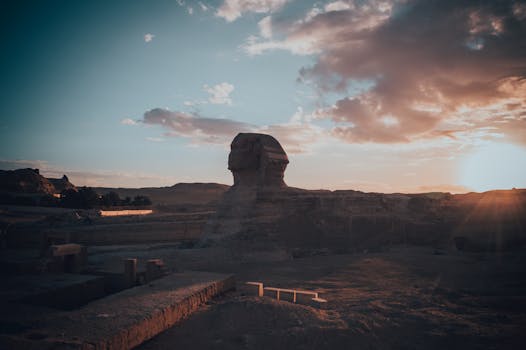A Journey Through Egyptian History

Egypt, a land of ancient wonders and modern marvels, holds a unique place in the annals of human history. From the grand pyramids to the bustling bazaars of Cairo, Egypt's rich tapestry is woven with stories of pharaohs, gods, and groundbreaking discoveries. This article takes you on a journey through key aspects of Egyptian history, exploring its monumental achievements and cultural legacy.
Ancient Egyptian Civilization
The civilization of ancient Egypt began around 3100 BCE with the unification of Upper and Lower Egypt under the first pharaoh, Narmer. This period marked the start of one of the most remarkable civilizations in history, known for its architectural feats, including the construction of the Great Pyramids of Giza. These pyramids, built during the Fourth Dynasty (c. 2580–2560 BCE), remain some of the most iconic structures in the world.
Ancient Egyptians excelled in various fields such as medicine, mathematics, and astronomy. They devised a calendar based on lunar cycles and developed early forms of surgery and dentistry. The Rosetta Stone, discovered in 1799, was instrumental in deciphering Egyptian hieroglyphs, unlocking a wealth of knowledge about their language and culture.
Their belief system centered around a pantheon of gods and goddesses, with Ra, Osiris, and Isis being among the most significant deities. Temples dedicated to these gods were not only places of worship but also centers of learning and administration. The Temple of Karnak in Luxor stands as a testament to their architectural prowess and religious devotion.
The Middle Kingdom and New Kingdom
The Middle Kingdom (c. 2050–1710 BCE) is often regarded as Egypt's classical age, marked by prosperity, stability, and achievements in literature and art. Pharaohs like Senusret III expanded Egypt's territory through military campaigns and trade expeditions. Literature flourished during this period with works such as "The Tale of Sinuhe" providing insights into Egyptian society and values.
The New Kingdom (c. 1550–1070 BCE) ushered in an era of empire-building and unprecedented wealth. Pharaohs such as Hatshepsut, Akhenaten, Tutankhamun, and Ramses II left indelible marks on history. Hatshepsut's reign was notable for extensive trade expeditions to Punt (modern-day Somalia), which brought back valuable goods like incense and ebony.
Akhenaten introduced revolutionary religious reforms by promoting the worship of Aten, a sun deity, over traditional polytheistic practices. However, his successor Tutankhamun restored the old religious order. Ramses II, also known as Ramses the Great, is celebrated for his military victories and monumental building projects like the temples at Abu Simbel.
Greco-Roman Period
The conquest of Egypt by Alexander the Great in 332 BCE marked the beginning of the Greco-Roman period. After Alexander's death, his general Ptolemy I Soter established the Ptolemaic dynasty which ruled Egypt until it became a Roman province in 30 BCE following Cleopatra VII's defeat by Octavian (later Augustus). Cleopatra is one of history's most famous figures due to her political acumen and romantic liaisons with Julius Caesar and Mark Antony.
This era saw significant cultural exchanges between Greek and Egyptian traditions. The city of Alexandria became a major center for learning and culture, housing the famous Library of Alexandria. This library was one of the largest and most significant libraries in the ancient world but was eventually destroyed under unclear circumstances.
During this period, many temples were built or expanded upon by Greek rulers adopting Egyptian styles. The Temple of Horus at Edfu is one such example that remains remarkably well-preserved today.
Modern Egypt
Modern Egypt emerged from centuries of foreign rule when it gained independence from British colonial rule in 1952 under President Gamal Abdel Nasser. Nasser's policies focused on modernization through industrialization while maintaining non-alignment during Cold War tensions.
The construction of the Aswan High Dam between 1960-1970 symbolized Egypt’s ambitions for economic development but also led to controversies over displacement issues associated with Lake Nasser’s creation behind it.
Today’s Egypt faces challenges related to political instability post-Arab Spring uprisings alongside opportunities presented by tourism centered around its rich historical heritage sites such as Luxor Temple complex or newly established Grand Egyptian Museum near Giza expected to open soon offering unparalleled exhibitions including treasures belonging Tutankhamun himself!
Significant Figures in Egyptian History
Egypt’s history is replete with notable figures who have left lasting legacies:
- Narmer: Unified Upper & Lower regions forming basis earliest pharaonic dynasties around 3100 BCE
- Hatshepsut: One prominent female pharaoh known extensive trade expeditions enhancing prosperity kingdom
- Tutankhamun: Famous young king restored traditional religious practices after Akhenaten’s monotheistic experimentations; tomb discovery provided invaluable archaeological insights
- Cleopatra VII: Last active ruler Ptolemaic Kingdom renowned political alliances love affairs Roman leaders Julius Caesar Mark Antony
- Gamal Abdel Nasser: Led revolution establishing Republic modernizing nation implementing significant economic reforms mid-20th century
| Era | Notable Figures | Key Achievements |
|---|---|---|
| Ancient Egypt | NarmerHatshepsutTutankhamunRamses II | UnificationTrade ExpeditionsRestored Religious OrderMonumental Constructions |
| Greco-Roman Period | Ptolemy I SoterCleopatra VII | Cultural ExchangePolitical Alliances |
| Modern Egypt | Gamal Abdel NasserAnwar SadatHosni Mubarak | IndustrializationPeace Treaty IsraelEconomic Reforms |
Modern-day visitors who explore the remnants of this ancient civilization—walking the streets of Cairo or visiting museums dedicated to preserving its heritage—find themselves part of an ongoing narrative. This journey bridges the past, present, and future, creating a seamless continuum of human experience that is timeless and unmatched anywhere else in the world. It's an unforgettable journey worth embarking upon at least once in a lifetime.
Delving into Egyptian history underscores the significance of understanding and appreciating the contributions made by this great civilization. These contributions have profoundly enriched our lives and fostered a sense of connection to a shared heritage that transcends the boundaries of time and space. This shared human story, unfolding across ages and eras, serves as a testament to the enduring spirit of mankind and our unwavering quest for knowledge and enlightenment. The legacy left behind by those who came before us paves the way for future generations, reminding us of our interconnectedness and the eternal quest for progress and understanding.